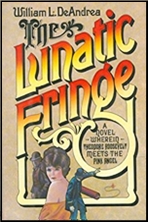Fri 21 Aug 2020
Archived Mystery Review: WILLIAM L. DeANDREA – The Lunatic Fringe.
Posted by Steve under Reviews[5] Comments
WILLIAM L. DeANDREA – The Lunatic Fringe. M. Evans, hardcover, 1980. Mysterious Press, paperback, 1985.

As far as mysteries go, the title of this one is a little bit of a puzzle in itself, perhaps. What it’s referring to is a group of dedicated election year radicals who have been rallying about the cause of the Democratic presidential candidate.
Not enough information, you say? Take, then, the book’s subtitle, which is: “A Novel Wherein Theodore Roosevelt Meets the Pink Angel.” Yes, that Theodore Roosevelt – – but he’s not the one running for President. The year is 1896, and William McKinley is the Republican candidate. Running against him, on the Democratic ticket, is William Jennings Bryan, the silver-tongued orator from Nebraska.
Bryan and his campaign are being backed by William Randolph Hearst, the new publisher of the New York Journal. Roosevelt is still only the president of that city’s Police Board, and his staunch ally in fighting corruption in the ranks is a young police officer named Muldoon. And it is Muldoon who innocently begins to unravel a plot which, left unchecked, would spell doom for half the city.
These were the days of an entirely different era, politically as well as socially. DeAndrea, whose two previous books have each won him an Edgar award, has caught the flavor well. There is a touch of Horatio Alger in Muldoon, a rough but ready Irish cop, and a warm sense of proud propriety in Katie, his older but still unmarried sister.
Regrettable are DeAndrea’s occasional lapses, as in much bad science fiction, into allowing his characters to talk to each other of things it seems they should already know. As a detective story, though, which ls what this is, parts fit, and parts don’t. Those that do are often muddled, though seldom beyond repair. Minor inconsistencies in character sometimes have a reason behind them, and sometimes they take the appearance of whims, fashioned to fit passing reflections.
Even so, although the motive for the murder Muldoon and his superior find themselves investigating seems in the end to have been rather nebulous, DeAndrea as the author produces a creditable surprise as to the identity of the killer.
It does not seem enough, unfortunately, to keep his award-winning streak alive at three.
Rating: C plus.
Editorial Update: William DeAndrea won three Edgars in all:
Killed in the Ratings 1978 (Edgar winner: Best First Novel)
The HOG Murders 1979 (Edgar winner: Best Paperback Original)
He won his third Edgar in 1994 for his reference work, Encyclopedia Mysteriosa.
August 21st, 2020 at 6:12 pm
When reading this decades ago, found it disappointing. Nowhere as good as “Killed in the Ratings”. Liked some of the Teddy Roosevelt historical color.
August 21st, 2020 at 8:09 pm
I had a bit of fun with this one, but it is a letdown from the earlier books.
I miss Bill’s column in TAD though. I disagreed with him more than half the time, but it was usually fun getting there.
August 21st, 2020 at 9:04 pm
I had drifted away from TAD around the time Bill’s column was appearing. I kept my subscription going, but for some reason, when it got some production values behind it, I found it a whole lot less interesting.
Which is a long way of saying, I know about his column and how controversial it was a lot of the time, but other than that, no specifics.
August 22nd, 2020 at 7:42 am
Not a fan of HOG MURDERS either. I prefer his genre writing to the fiction.
August 22nd, 2020 at 9:21 am
I never got past the cover of HOG MURDERS. I have always thought it a particularly ugly one.